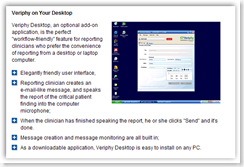Medical transcription, the target of outsourcing, yes it is happening, but one thing missed in this entire article, which is the real long term threat to  medical transcribing is “speech recognition”. Between using electronic medical records that organize and simplify patient charts, speech recognition is also widely used, and this in fact cuts out the outsourced contractor. It’s not all that simple as there is training required and a learning curve for the physicians. Some hospitals have already enjoyed some success and are also saving money, plus it’s all in house, nothing over the internet.
medical transcribing is “speech recognition”. Between using electronic medical records that organize and simplify patient charts, speech recognition is also widely used, and this in fact cuts out the outsourced contractor. It’s not all that simple as there is training required and a learning curve for the physicians. Some hospitals have already enjoyed some success and are also saving money, plus it’s all in house, nothing over the internet.
We are now starting to see some web based solutions in this area as far as access. As noted below, the Veteran’s Hospital in Long Beach has no transcribers. The entire VA system uses electronic medical records and the system is called Vista, been around for a long time.
Just a couple days ago I wrote about RadWhere from Nuance, speech recognition for Radiology. I think the writer of this article perhaps was not aware of where transcription services were really going. I use it to do my blogs!
The US Army is using it with their medical records. They use it on the battlefield as well. Their e-Scription services allow speech recognition to be loaded on a server.
Speaking of the VA, in Tennessee they have licensed 750 licenses for Dragon Naturally Speaking and the Los Angeles VA has a pilot program with 6 regular users working with speech recognition.
The Epic records system at Kaiser uses speech recognition in conjunction with radiology and integration. Nuance also has this nice little program, voicemail to text from a cell phone.
At UCLA, another portion of Nuance is used that has HL-7 integration and links to the EMR.
Beth Israel Deaconess Hospital found a great solution with e-Scription and reduced transcription cost by 50% in Boston.
Vocada Veriphy-Ready HL7 Integration Server (VIS), which allows Vocada Veriphy, the company's critical test result management (CTRM) solution, communicate directly with internal diagnostic systems and enterprise-wide clinical information systems. Critical test results from any internal diagnostic system are thus automatically routed to the ordering physician, populated in the patient record and verified and audited.
Back in 2005, Dr. Crounse from Microsoft made this video with the Overlake Hospital, at at that time they eliminated all transcription services with speech recognition, so this is nothing that is new but the technology gets better and smarter all the time.
Anyway, as you can see from some of the examples, the fate of the transcriptionists is at the hands ultimately of technology and not really the interim outsourcing contractors being used at present. This point and the real ultimate fate of what is happening with transcriptions seemed to have been missed here. BD
LONG BEACH - There's a common perception that jobs in the medical field are high-paying, plentiful and perhaps most attractive in an era of high unemployment, "recession-proof."
While that notion may hold true for physicians, nurses and others involved in direct patient care, for back-office workers like Kathie Welch, the reality can be much different.
After 30 years as a medical transcriptionist, documenting patient records for doctors, Welch was laid off in September when her employer transferred much of her workload to an office in India.
Shocked, she began contacting former employers and co-workers for job leads, but found only part-time work at less than half her previous pay.
Outsourcing transcription work abroad - to countries such as India, Pakistan, Philippines and the Caribbean - has grown more popular as transmitting confidential health information over the Internet has become more secure, the the bureau report states. "However, the demand for overseas transcription services is expected only to supplement the demand for well-trained domestic medical transcriptionists."
A survey of area hospitals revealed many contract outside agencies to transcribe patient records, though Long Beach Memorial Medical Center has a staff of 38 transcribers on site.
The Veterans Affairs Medical Center hospital on Seventh Street doesn't use any transcribers - in-hour or off-site - and instead requires physicians to directly input medical files, said VA spokesman Richard Beam.
Medical jobs may not be as recession-proof as touted - Press-Telegram
Related Reading:




Medical transcription has been in decline for quite some time, aided and abetted by low entry requirements, no standards, cutthroat pricing aggravated by overseas cutthroat pricing, and now technology. It's only recession proof with respect to the fact that medical transcriptionists still have jobs, but pay rates and working conditions were declining even in a good economy.
ReplyDeleteWe are an accelerated rate right now of having computers replace humans due to the economy and the lack of money.
ReplyDeleteJobs created for medical language specialists from increased penetration of digitized patient records are likely to exceed medical language specialist jobs lost to technology gains. Misalignment of the timing of job gains and job losses may result in the exodus of skilled medical language workers.
ReplyDeletebut....watch for the big reversal when the industry wakes up to the two major challenges
ReplyDelete- turning our most highly paid, skilled and costly individuals into data entry clerks does not make economic sense
- loosing the narrative looses significant value as much of the essential detail of the record is contained here and cannot be replaced by cookie cutter choices
See
http://speechunderstanding.blogspot.com/2009/04/telling-full-story.html
Nick van Terheyden, MD
Chief Medical OfficerM*Modalwww.mmodal.comnvt@mmodal.comdrnic1@gmail.comTwitterRSS Feed - Speech UnderstandingRSS Feed - Navigating HealthcareM*Modal - Speech Understanding - www.mmodal.com
Although this article is dated many months back, but still we can see that is what is happening, and who are still blind to all this, will be taken by the wind.
ReplyDeleteAlthough outsourcing and voice recognition have made some impact on the medical transcription field, I am confident that there will always be a need for native transcriptionists, even if they are to edit voice recognition reports. The accuracy rate is nowhere near what is required when peoples' lives are at stake. Also, some physicians and healthcare organizations are hesitant to outsource their transcription work overseas due to regulations and security concerns.
ReplyDeleteits really a sad reality that there are already electronic gadgets that can replace medical transcriptionist. also the fact that those hospitals and companies are using outsourcing is a really big ouch for old MTs. It is really a sad truth.
ReplyDeleteJust like any other jobs, there might be some places wherein the demand for medical transcriptionists are very low but there are still a lot of places where they are very needed and they are still growing. the good thing about jobs like this is that if you are really good with your MT job, people are going to find you and you can work for them wherever they are as long as you can be online.
ReplyDelete